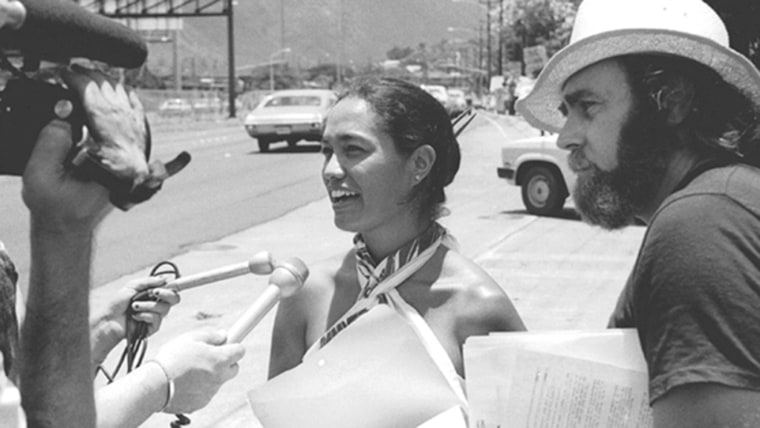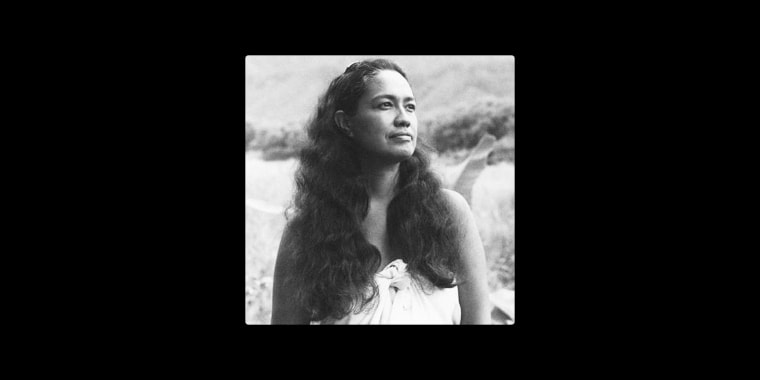Haunani-Kay Trask, a renowned scholar and advocate for Hawaiian sovereignty, died over the weekend at age 71 after living with Alzheimer’s disease for years.
Trask, a professor, author and poet, was best known for fiercely speaking out against U.S. imperialism and its colonization of Hawai'i. The death of the activist, who regularly called out the devastating effects of military occupation and tourism on the Indigenous people, was mourned by many in the Asian American and Pacific Islander community, including Democratic Sen. Mazie Hirono of Hawai'i and Rep. Kaialiʻi Kahele, the second Native Hawaiian congressman in U.S. history.
Maile Arvin, Native Hawaiian feminist scholar and assistant professor of history and gender studies at the University of Utah, told NBC Asian America that Trask was critical in shaping contemporary Native Hawaiian culture.
“It is hard to imagine contemporary Native Hawaiian politics, poetry or scholarship without the gift of her work,” Arvin said. “Nearly every Native Hawaiian person I know has a story about how she impacted their life, whether through being a student of hers, reading her writing or listening to her speak.”
Trask, who was born in California in 1949 but grew up in Hawai'i, was vocal about uplifting Indigenous nations and gained widespread support for her cause beginning in the 1970s. Regarded as a co-founder of the contemporary field of Hawaiian studies, the activist became the first tenured professor in the field at the University of Hawai'i at Manoa in 1986 and served as the founding director of the university’s Center for Hawaiian Studies.
“As one of the very first Native Hawaiian women to be hired as a professor at the University of Hawai‘i, Dr. Trask was the first to openly speak out against white supremacy,” wrote Noelani Goodyear-Kaʻōpua, one of Trask’s former students who is now professor of political science at the University of Hawai'i at Manoa, in December. “She employed multiple forms of poetry and prose in an unapologetic rhetorical style that garnered local and national press attention, mainly due to her searing analyses of white supremacist racism in a place that had become known as a multicultural ‘melting pot’ and ‘paradise.’”

Among her many achievements, the activist became respected for her outspoken rejection of American occupation of Hawaiian lands and the hypocrisy of U.S. policy. For example, in a 1990 episode of television show “Island Issues,” Trask responded to a caller in Hawai'i who took issue with “rallies against the white man” regarding land ownership.
“You think you are in America. You are not in America. You are in a colony that is in Polynesia that is forcibly taken, just as, I might add, all of Eastern Europe was forcibly taken by the Soviet Union, which Americans think is a very, very bad place, the bad, bad Soviet Union,” Trask said. “Well, the bad, bad United States of America took Puerto Rico, it took Alaska, it stole Indian land, it took Hawai'i, it took Guam, took Micronesia, Pulau, and you had better learn that history because you are the recipient of an imperialist tradition.”
On the 100th anniversary of the illegal overthrow of the Hawaiian Kingdom, in 1993, Trask famously spoke in front of Iolani Palace, the home of Hawaii's last reigning monarchs, saying to the crowd, “We are not American.”
“Say it in your heart. Say it when you sleep. We are not American. We will die as Hawaiians. We will never be Americans,” Trask said. “They took our land. They imprisoned our queen. They banned our language. They forcibly made us a colony of the United States. America always says they are democratic. Lies.”
Trask rallied vehemently against the dominant understanding of tourism. While much of the industry is framed as something that “Native Hawaiians should be grateful for,” Arvin said Trask opposed it and “consistently demonstrated that Native Hawaiians have suffered from colonial oppression in many ways.” Trask also participated in Protect Kahoʻolawe ʻOhana, a grassroots organization that successfully organized to stop the U.S. military bombing of the island of Kahoʻolawe in the late 1970s, Arvin said.
"Through her work, she showed us that Native Hawaiians can create different futures for ourselves," Arvin said.
Trask’s work was particularly critical because it spotlighted the intersectional nature of colonization with gender-based violence and discrimination, Arvin said.
“Personally, as a Native Hawaiian woman, reading her book ‘From a Native Daughter’ was life-changing because it very critically explained the history and ongoing conditions of colonialism in Hawaii,” Arvin said. “She paid particular attention to how colonialism was gendered, for example, in the symbol of the Hawaiian hula girl, which is used to market tourism in Hawaii.”
Arvin added: “Her book put into words many of the things I had felt but had never seen anyone describe so viscerally and with such deep love for Native Hawaiian people and land.”
Throughout the years, Trask picked up numerous academic accolades for her work, including the Angela Y. Davis lifetime achievement award from the American Studies Association. She was also elected to the prestigious American Academy of Arts and Sciences.
“I know that her legacy will live on in so many who have been galvanized by her love and passion for Hawaiian people, politics and life,” Arvin said.
